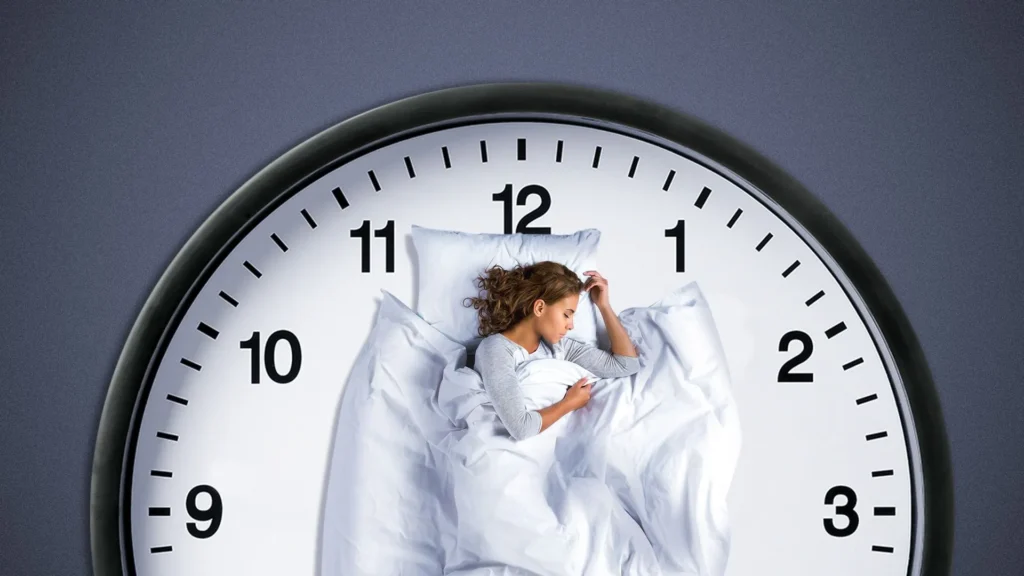
Maintaining a consistent sleep schedule is crucial for good health. Here’s a general guide for healthy sleep timings based on age:
1. Adults (18-64 years)
- Recommended Sleep Duration: 7-9 hours per night.
- Ideal Sleep Time: Between 10:00 PM – 11:00 PM.
- Wake-Up Time: Between 6:00 AM – 7:00 AM.
2. Older Adults (65+ years)
- Recommended Sleep Duration: 7-8 hours per night.
- Ideal Sleep Time: Between 9:00 PM – 10:00 PM.
- Wake-Up Time: Between 5:00 AM – 6:00 AM.
3. Teenagers (14-17 years)
- Recommended Sleep Duration: 8-10 hours per night.
- Ideal Sleep Time: Between 9:00 PM – 10:00 PM.
- Wake-Up Time: Between 6:00 AM – 7:00 AM.
4. Children (6-13 years)
- Recommended Sleep Duration: 9-11 hours per night.
- Ideal Sleep Time: Between 8:00 PM – 9:00 PM.
- Wake-Up Time: Between 6:00 AM – 7:00 AM.
5. Preschoolers (3-5 years)
- Recommended Sleep Duration: 10-13 hours per night.
- Ideal Sleep Time: Between 7:00 PM – 8:00 PM.
- Wake-Up Time: Between 6:00 AM – 7:00 AM.
Tips for Better Sleep:
- Consistency: Try to go to bed and wake up at the same time every day, even on weekends.
- Environment: Make your sleeping environment comfortable—cool, dark, and quiet.
- Limit Screen Time: Avoid screens at least 1 hour before bed.
- Wind-Down Routine: Engage in relaxing activities before bed, like reading or meditating.
- Diet and Exercise: Avoid heavy meals, caffeine, and alcohol close to bedtime. Regular exercise can promote better sleep, but not too close to bedtime.
Maintaining these habits can improve your sleep quality and overall health.
4o

Sleep is important for your health, and getting enough quality sleep can help maintain your physical and mental health. The amount of sleep you need depends on your age, but adults generally need 7–9 hours per night. Babies and toddlers may need 11–17 hours, and children under 7 may benefit from naps. Sleeping more than 9 hours may be helpful for young adults, people recovering from sleep deprivation, or people who are sick.
Here are some benefits of getting enough sleep:
- Brain functionSleep helps support healthy brain function, including memory consolidation, thinking, and decision making.
- Physical healthSleep helps repair your heart and blood vessels, and may promote the removal of waste products from brain cells. It also helps your body regulate hormones that control hunger and fullness, and may help prevent prediabetic states.
- Mental healthSleep can help reduce stress and improve your mood. It may also help with symptoms of depression, seizures, high blood pressure, and migraines.
- Growth and developmentDeep sleep triggers the release of hormones that promote normal growth in children and teens.
Not getting enough sleep can negatively affect your health, including:
- ImmunitySleep can help compromise your immunity, increasing your risk of illness and infection.
- Metabolic syndromeSleep can help your liver digest fats at the right times, and not getting enough sleep can lead to increased consumption of fatty, sweet, and salty foods.
- BehaviorSleep can affect how you think, behave, and get along with others. For example, drowsy driving can cause thousands of car accidents every year.
- How Sleep Works – Why Is Sleep Important? | NHLBI, NIH24 Mar 2022 — Metabolism and sleep … For example, the circadian clocks make sure that your liver is prepared to help digest fats at…National Institutes of Health (NIH) (.gov)
- Get Enough Sleep – MyHealthfinder | health.gov1 May 2024 — Why is getting enough sleep important? Getting enough sleep has many benefits. It can help you: Get sick less often. Sta…Office of Disease Prevention and Health Promotion
- How Sleep Works – How Much Sleep Is Enough? | NHLBI, NIH24 Mar 2022 — Language switcher. … Experts recommend that adults sleep between 7 and 9 hours a night. Adults who sleep less than 7 …National Institutes of Health (NIH) (.gov)
In EnglishMost adults need 7 or more hours of sleep each night. It’s also important to get good-quality sleep on a regular schedule so you feel rested when you wake up. If you often have trouble sleeping — or if you often still feel tired after sleeping — talk with your doctor.
